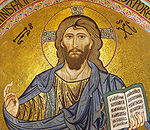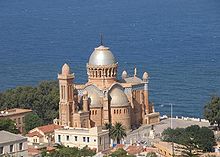- Christianity in Algeria
-
Christianity by Country
North AmericaSouth AmericaOceaniaChristianity came to North Africa in the Roman era. Its influence declined during the chaotic period of the Vandal invasions but was strengthened in the succeeding Byzantine period, only to disappear gradually after the Arab invasions of the 7th century.[1] Christianity is the fastest growing religion in Algeria. North Africa is primarily Muslim: Islam is the state religion of Algeria, Libya, Morocco and Tunisia. While the practice and expression of other faiths is guaranteed by law, the same legal framework tends to restrict them insofar as overt proselytising is concerned.
Converts to Christianity may be investigated and searched by the authorities.[2] Although the current number of Christians in North Africa is low, churches built during the French and to a lesser extent Italian rule can still be found. There is some evidence that there has been an increase in conversions to Christianity among North African Muslims in recent years. The total number of Christians remains very low relative to the populations of those countries. The percentage of Christians in Algeria is less than 2% (2009). In 2009, the UNO counted 45,000 Roman Catholics and 50,000 to 100,000 Protestants in the country.
Conversions to Christianity have been most common in Kabylie, especially in the wilaya of Tizi-Ouzou.[3] In that wilaya, the proportion of Christians has been estimated to be between 1% and 5%. Christians have at times been subjected to religiously-motivated attacks. In 1996, Mgr Pierre Claverie, bishop of Oran, was assassinated by terrorists. This murder occurred soon after that of seven monks of the Trappistes of Tibérine, and of six nuns. During that era, commonly known as the black decade, between 100,000 and 200,000 Algerians lost their lives.
Contents
Indigenous Christianity after the Arab conquest
The conventional historical view is that the conquest of North Africa by the Islamic Umayyad Caliphate between AD 647 and 709 effectively ended Catholicism in Africa for several centuries.[4] The prevailing view is that the Church at that time lacked the backbone of a monastic tradition and was still suffering from the aftermath of heresies including the so-called Donatist heresy, and this contributed to the earlier obliteration of the Church in the present day Maghreb.[5] Some historians contrast this with the strong monastic tradition in Coptic Egypt, which is credited as a factor that allowed the Coptic Church to remain the majority faith in that country until around after the 14th century AD.
However, new scholarship has appeared that disputes this. There are reports that the Roman Catholic faith persisted in the region from Tripolitania (present-day western Libya) to present-day Morocco for several centuries after the completion of the Arab conquest by 700 AD. A Christian community is recorded in 1114 in Qal'a in central Algeria. There is also evidence of religious pilgrimages after 850 AD to tombs of Catholic saints outside of the city of Carthage, and evidence of religious contacts with Christians of Muslim Spain. In addition, calendar reforms adopted in Europe at this time were disseminated amongst the indigenous Christians of Tunis, which would have not been possible had there been an absence of contact with Rome.
Local Catholicism came under pressure when the Muslim fundamentalist regimes of the Almohads and Almoravids came into power, and the record shows demands made that the local Christians of Tunis to convert to Islam. There are reports of Christian inhabitants and a bishop in the city of Kairouan around 1150 AD - a significant report, since this city was founded by Arab Muslims around 680 AD as their administrative center after their conquest. A letter in Catholic Church archives from the 14th century shows that there were still four bishoprics left in North Africa, admittedly a sharp decline from the over four hundred bishoprics in existence at the time of the Arab conquest.[6] Berber Christians continued to live in Tunis and Nefzaoua in the south of Tunisia up until the early 15th century, and the first quarter of the 15th century, the native Christians of Tunis, though much assimilated, extended their church, perhaps because the last Christians from all over the Maghreb had gathered there.[6]
Reintroduction of Christianity
The Roman Catholic Church was reintroduced in Algeria after the French conquest, when the diocese of Algiers was established in 1838. Proselytization of the Muslim population was at first strictly prohibited; later the prohibition was less vigorously enforced, but few conversions took place. The several Roman Catholic missions established in Algeria were concerned with charitable and relief work; the establishment of schools, workshops, and infirmaries; and the training of staff for the new establishments. Some of the missionaries of these organizations remained in the country after independence, working among the poorer segments of the population. In the early 1980s, the Roman Catholic population numbered about 45,000, most of whom were foreigners or Algerians who had married French or Italians.[1]
Under French rule, the Catholic population of Algeria peaked at over one million, but most of them left following Algeria's independence in 1962. In recent years, there has been a rise of Islamic fundamentalism, culminating in the 1996 murder of Pierre Claverie, bishop of Oran.[2]
The country is divided into four dioceses, including one archdiocese.
- Archdiocese of Alger
- Diocese of Laghouat (Immediately subject to the Holy See)
The diocese of Algeria was established in 1838 with the conquest of Algeria by French colonial troops. All proselytism among Muslims has long been prohibited and the role of the Catholic Church is limited to acts of charity.
Protestantism
Protestants number some 50,000 to 100,000 in Algeria. [7] This small population generally practices its faith without government interference.[8] However, converts from Islam can be exposed to the risk of attack by extremists.[8] Missionary groups are permitted to conduct humanitarian activities without government interference as long as they are discreet and do not proselytize openly.[8] Since 2006 missionary outreach among Muslims can be punished with up to five years of prison.[9] The Protestant Church of Algeria is a Reformed Church with about 10,000 members.[10] The Protestant Church of Algeria is one of only two officially recognized Christian organizations in the country.[11] Most Christians meet in homes, to protect themselves, according to ICC. The country's Minister of Religious Affairs has called the evangelical churches "dangerous." [12]
Protestant denominations in Algeria include:[13]
- Armée du Salut
- Assemblées de Dieu
- Eglise Adventiste du Séptieme Jour
- Eglise Evangélique Copte
- Eglise Protestante d'Algérie
- Frères Larges
- Mission Baptiste Evangélique
- Mission Biblique de Ghardaia
- Mission d'Afrique du Nord
- Mission Evangélique au Sahara
- Mission Evangélique de Médéa
- Mission Evangélique du Sahara
- Mission Rolland
References
- ^ a b Deeb, Mary Jane. "Religious minorities" Algeria (Country Study). Federal Research Division, Library of Congress; Helen Chapan Metz, ed. December 1993. This article incorporates text from this source, which is in the public domain.[1]
- ^ "Echorouk Online - A postal executive in Tlemcen province under security investigation into the shady circumstances surrounding his decision to embrace Christianity". http://www.echoroukonline.com/eng/algeria/11611-a-postal-executive-in-tlemcen-province-under-security-investigation-into-the-shady-circumstances-surrounding-his-decision-to-embrace-christianity.html. Retrieved 2011-01-03.
- ^ *(French) Sadek Lekdja, Christianity in Kabylie, Radio France Internationale, 7 mai 2001
- ^ http://www.bethel.edu/~letnie/AfricanChristianity/WesternNorthAfricaHomepage.html
- ^ The Disappearance of Christianity from North Africa in the Wake of the Rise of Islam C. J. Speel, II Church History, Vol. 29, No. 4 (Dec., 1960), pp. 379-397
- ^ a b http://www.orthodoxengland.org.uk/maghreb.htm
- ^ "Wikipedia on Christianity in Algeria". http://en.wikipedia.org/wiki/Christianity_in_Algeria.
- ^ a b c "Wikipedia on Status of religious freedom in Algeria". http://en.wikipedia.org/wiki/Status_of_religious_freedom_in_Algeria.
- ^ "German Site of the International Society for Human Rights". http://www.igfm.de/index.php?id=384&cHash=abfb1fbff8&tx_ttnews%5Btt_news%5D=579&tx_ttnews%5BbackPid%5D=20.
- ^ "Wikipedia on Protestant Church of Algeria". http://en.wikipedia.org/wiki/Protestant_Church_of_Algeria.
- ^ "PC(USA) Mission Yearbook for Prayer and Study". http://www.pcusa.org/missionyearbook/Jun/11.htm.
- ^ "Open Doors UK". http://www.opendoorsuk.org/wwl_profiles/algeria.htm.
- ^ The World Christian Encyclopedia, Second edition, Volume 1, p. 57
Translated from fr:Christianisme au Maghreb: Introduction and Christianisme en Algérie sections
External links
- Theology in Africa
- The African roots of Latin Christianity by Henri Teissier, Bishop of Algeria
- Muslims Turn to Christ in Algeria - CBN Report
- Statistics relating to the Catholic Church in Algeria
Christianity in Africa Sovereign
states- Algeria
- Angola
- Benin
- Botswana
- Burkina Faso
- Burundi
- Cameroon
- Cape Verde
- Central African Republic
- Chad
- Comoros
- Democratic Republic of the Congo
- Republic of the Congo
- Côte d'Ivoire (Ivory Coast)
- Djibouti
- Egypt
- Equatorial Guinea
- Eritrea
- Ethiopia
- Gabon
- The Gambia
- Ghana
- Guinea
- Guinea-Bissau
- Kenya
- Lesotho
- Liberia
- Libya
- Madagascar
- Malawi
- Mali
- Mauritania
- Mauritius
- Morocco
- Mozambique
- Namibia
- Niger
- Nigeria
- Rwanda
- São Tomé and Príncipe
- Senegal
- Seychelles
- Sierra Leone
- Somalia
- South Africa
- South Sudan
- Sudan
- Swaziland
- Tanzania
- Togo
- Tunisia
- Uganda
- Zambia
- Zimbabwe
States with limited
recognition- Sahrawi Arab Democratic Republic
- Somaliland
Dependencies and
other territories- Canary Islands / Ceuta / Melilla / Plazas de soberanía (Spain)
- Madeira (Portugal)
- Mayotte / Réunion (France)
- Saint Helena / Ascension Island / Tristan da Cunha (United Kingdom)
- Western Sahara
Culture of Algeria Cinema Cuisine Literature Media Music Religion Sport Symbols See also Categories:
Wikimedia Foundation. 2010.


